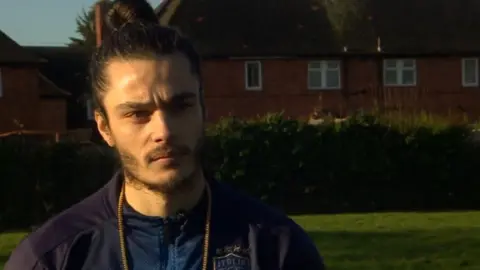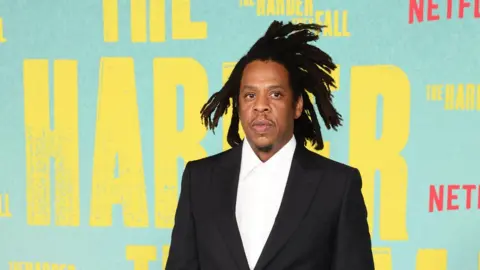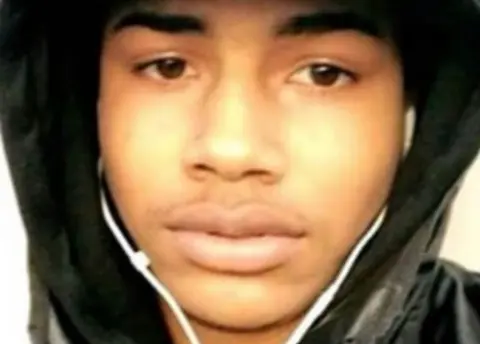CPS to review guidance on using drill music as evidence
The Crown Prosecution Service (CPS) is updating its guidance on the use of drill music as evidence in criminal trials.
It follows concerns from defence lawyers and academics who believe it can stop defendants - often young black men - getting a fair trial.
The CPS said it was not aware of any cases where drill music had been wrongly used as evidence in the past.
However it said it was listening to the concerns of various people and groups.
These include academics, barristers, civil liberties groups, and a youth group in Nottingham - The Pythian Club - who have all taken part in a "listening exercise" with the CPS.
Nick Federici, a youth worker at the Pythian Club, believes there are misconceptions about drill.
"Drill is just the youth expressing themselves," he said.
"Drill doesn't cause crime in deprived areas. It's poverty, it's envy, it's so many other things going on, underlying issues."

However, Mr Federici believes drill videos can sometimes "speed up a process" when they are spread via the internet and social media.
"Obviously if somebody gets on a song and calls my name out and tells me this and that, it's going to provoke me," he said.
"I don't believe it can start and cause violence, but it can definitely speed up a process, just through pure embarrassment.
"It might make someone feel like they need to react because they've been spoken about on the internet."
 Getty Images
Getty ImagesIn the US, Jay-Z is supporting a change in New York law that would make it harder for rap lyrics to be used as evidence in criminal trials - known as the Rap Music on Trial bill.
In the UK, research by the BBC suggests drill music is increasingly being used as evidence in criminal trials.
Music videos of defendants are sometimes used to help establish a motive, such as in the murder of Lyrico Steede in Nottingham.
During the trial it was said a dispute between Mr Steede and his killers was fuelled by drill music videos in which they insulted and threatened each other.
While he lay dying in hospital, the man who stabbed him appeared in a response video rapping about violence.
 Nottinghamshire Police
Nottinghamshire PoliceClaire Lindley, a chief crown prosecutor who is also the CPS lead on serious violence, said it was important for drill music only to be used when it is important and relevant to a case.
"When we're deciding whether to use any piece of evidence in a criminal case we have to decide whether it's probative evidence and not unduly prejudicial to the defendant," she said.
"When it comes to drill music we will obviously apply the same rules.
"We're really, really keen to make sure that our prosecutors don't use any kind of stereotypes or anything of that nature.
"We certainly shouldn't be using the video if it has simply a prejudicial effect."
The Crown Prosecution Service's existing guidance for prosecutors states gangs are "increasingly using drill music and social media to promote gang culture, glamorise the gang lifestyle and the use of weapons".
"They may post videos online that seek to taunt rivals, incite violence or glamorise criminality," it says.
"The videos often show the brandishing of weapons, include incendiary remarks about recent incidents of young people being killed or seriously injured, and threats to stab or shoot specific individuals and members of rival groups."
The guidance claims disputes can then "escalate very quickly" due to the "instant nature of social media".
'Widely used stock phrases'
Eithne Quinn, an academic at the University of Manchester who has been a rap expert in court cases for over a decade, believes "any new guidance to prosecutors that restricts the flow of rap into our courtrooms will be very welcome".
"It will be a first step if they remove rap from their so-called 'gangs' guidance," she said.
"Gang discourses are already so racially charged, producing serious racial disparities in criminal justice outcomes, as has been widely recognised.
"Once you add popular music to the mix, which conjures strong feelings and thoughts, then the gang discourses become even more open to abuse, reproducing broad racist tropes."
Prof Quinn said she had seen lines of verse described as a confession, despite these being composed before the incident.
"Violent boasts about stabbing - granted often very graphic and brutal - are presented as specifically correlating with a crime when they're just widely used stock phrases in drill," she said.
"Splicing lines together to change meaning and make lyrics seem to match an incident is a practice I've seen on several occasions."
Prof Quinn is in favour of the law change being supported by Jay-Z.
"We need something like that here," she said.
"There needs to be a really good reason to allow rap videos and lyrics before a jury. It's wide open to unfair and racist misreading."

Follow BBC East Midlands on Facebook,Twitter, or Instagram. Send your story ideas to [email protected].
